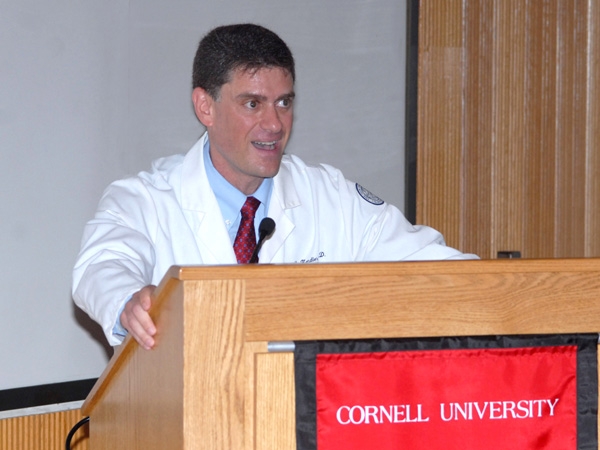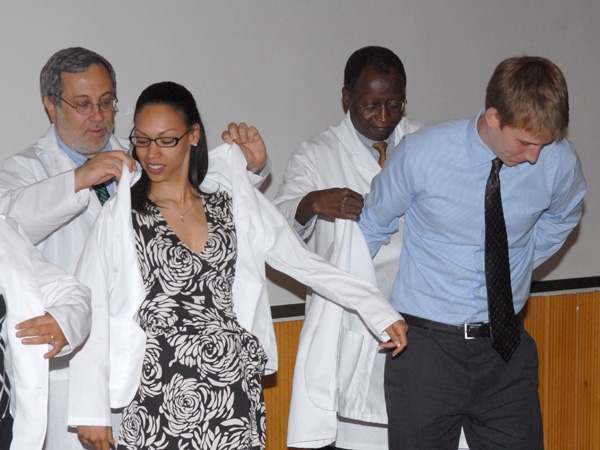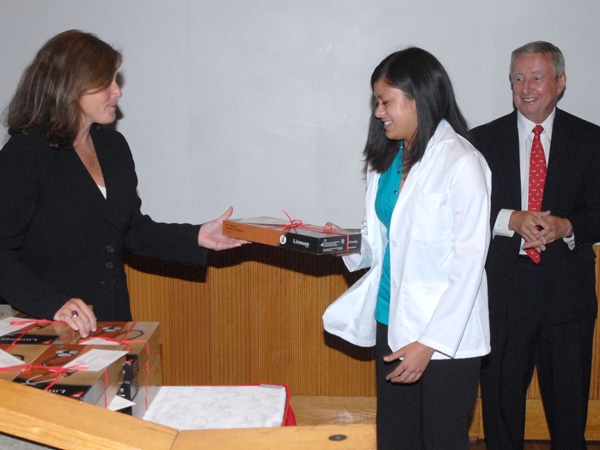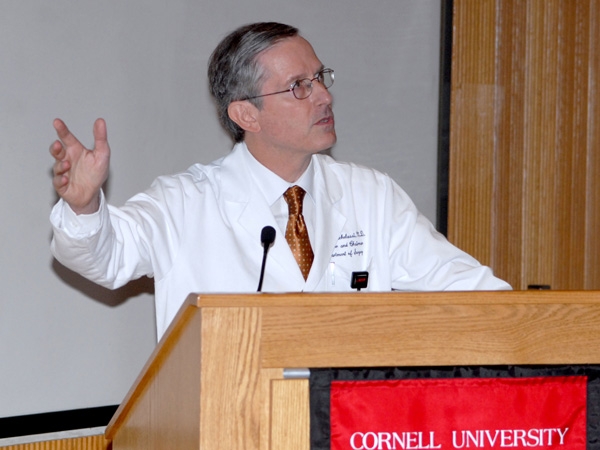Late one night, Dr. Jason Kendler, clinical associate professor of medicine at Weill Cornell Medical College, received a call from one of his patients — an elderly woman with late-stage pancreatic cancer who was now vomiting blood.

Dr. Jason Kendler speaks to the 101 students of the new class.
"I could have told her to go to the emergency room," Dr. Kendler said. "It certainly would have been something they could handle, and to be honest, there was very little medically that could have been done."
Instead, Dr. Kendler got out of bed and met his patient and her family at the hospital.
"When I got there, the family was grateful — grateful for all the care their mother and grandmother had received, and grateful that, at the end, her doctor was there," he said.
In telling this story as keynote speaker at this year's White Coat Ceremony, Dr. Kendler gave an audience of 101 first-year medical students their first lesson in being a doctor: Sometimes, it's just about being there.
As hundreds have before them, students in groups of four walked to the front of Uris Auditorium to receive the garment that will most readily identify them as future practitioners of medicine. In a new twist to the ceremony, several alumni also donated stethoscopes for the new students. Medical College Dean Dr. Antonio M. Gotto Jr.; Dr. Oliver T. Fein, associate dean for affiliations; Dr. Peter Marzuk, associate dean for curricular affairs; and other distinguished faculty members bestowed the symbolic coats among the first-year students. Dr. Charles Bardes, associate dean for admissions and professor of clinical medicine, introduced the new class to a packed auditorium of proud family and friends.

Dr. Paul Miskovitz and Dr. Estomih Mtui help students into their white coats.
Dr. Kendler impressed upon the physicians-to-be that in order to attain the level of personal and professional fulfillment most doctors enjoy, there will be nights when they get out of bed to be at a patient's side, that their words and actions as a doctor carry greater weight and consequence than those of other people.
"This ceremony is about transitions, a transition from who you were yesterday to who you are today," Dr. Kendler said. "When you put on your white coat, people will confide in you. Your words will carry more impact. You will be a teacher."
Just before the students were presented with their coats, Dean Gotto gave them a little preview of where they might be in four years.
"The good news is I'm going to read you the Hippocratic Oath right now," Dean Gotto said. "The bad news is I can't administer it to you because you still have four years of medical school to go through. In 2013, you'll stand up in Carnegie Hall with your classmates from Doha, Qatar, and take this oath."
Before gathering in Archbold Commons for the reception, Dr. Fabrizio Michelassi, the Lewis Atterbury Stimson Professor and chairman of the Department of Surgery, delivered an introductory lecture to the students, recalling his own white-coat ceremony in 1969, just two days after Neil Armstrong landed on the moon.
"There are three gifts you receive when entering medical school," he said. "A sense of purpose, a sense of place, and a code of professional ethics. You have already accomplished so much in making it to this day. But much more awaits you."

The students received new stethoscopes donated by alumni.

Dr. Fabrizio Michelassi recalls his own white-coat ceremony in 1969.
Photography by Weill Cornell Art & Photography.

